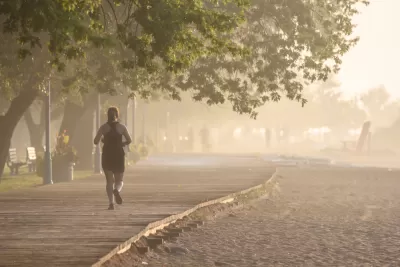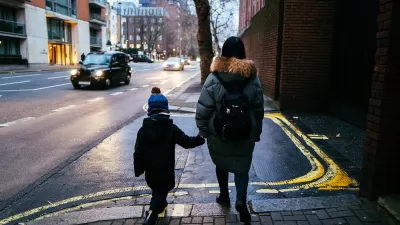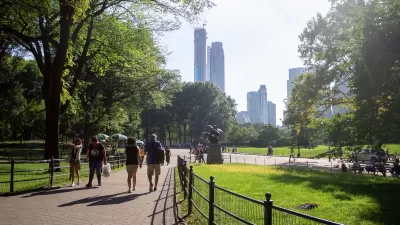A writer in Toronto imagines how the city would be evaluated according to a "Run Score"—a fast-paced version of the Walk Score.

Alexander Bimm writes from Toronto, which has already seen a fair amount of research and investment into the city's walkability, resulting in a position as the second most walkable city in Canada. Given the health benefits, and even potentially the mobility benefits, of running, Bimm wonders about what it would take to produce a new runnability index, something called a "Run Score."
According to Bimm, Toronto has a network of trails that offer runners an embarrassment of riches that could help with a Run Score: "what makes Toronto so great for running is that you can run from your door and promptly arrive to a great network of trails within 10 minutes. In some other cities, by contrast, he has to bike or drive to a nearby trail before starting his run."
As for how the Run Score would be calculated, it would probably resemble the Walk Score. "But scoring runnability might also consider new factors that are based on how convenient it is for people to run in that area," according to Bimm. "In particular, a run score could highlight areas in the city that have access to running facilities and well-maintained trails. It can also consider the topography and speed limits of a neighbourhood."
Bimm also makes the case that the hypothetical run score could benefit planners by notifying them of parts of the city that need additional investments in public health. Residents would benefit by more awareness to the kinds of infrastructure that supports a healthy lifestyle.
FULL STORY: Run Score: Mapping Toronto’s Runnability

Alabama: Trump Terminates Settlements for Black Communities Harmed By Raw Sewage
Trump deemed the landmark civil rights agreement “illegal DEI and environmental justice policy.”

Study: Maui’s Plan to Convert Vacation Rentals to Long-Term Housing Could Cause Nearly $1 Billion Economic Loss
The plan would reduce visitor accommodation by 25% resulting in 1,900 jobs lost.

Planetizen Federal Action Tracker
A weekly monitor of how Trump’s orders and actions are impacting planners and planning in America.

Wind Energy on the Rise Despite Federal Policy Reversal
The Trump administration is revoking federal support for renewable energy, but demand for new projects continues unabated.

Passengers Flock to Caltrain After Electrification
The new electric trains are running faster and more reliably, leading to strong ridership growth on the Bay Area rail system.

Texas Churches Rally Behind ‘Yes in God’s Back Yard’ Legislation
Religious leaders want the state to reduce zoning regulations to streamline leasing church-owned land to housing developers.
Urban Design for Planners 1: Software Tools
This six-course series explores essential urban design concepts using open source software and equips planners with the tools they need to participate fully in the urban design process.
Planning for Universal Design
Learn the tools for implementing Universal Design in planning regulations.
Caltrans
Smith Gee Studio
Institute for Housing and Urban Development Studies (IHS)
City of Grandview
Harvard GSD Executive Education
Toledo-Lucas County Plan Commissions
Salt Lake City
NYU Wagner Graduate School of Public Service





























